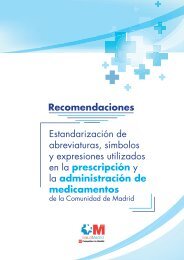lKd7nD
lKd7nD
lKd7nD
You also want an ePaper? Increase the reach of your titles
YUMPU automatically turns print PDFs into web optimized ePapers that Google loves.
language of the original text, turns the “crib” into a<br />
finished translation. The most significant limitation in<br />
this arrangement, of course, is that the informant has<br />
difficulties clarifying the levels of ambiguity in the<br />
original word, phrase, or context.<br />
2) One member is native or near native in the<br />
source language, while the second member, who has<br />
some understanding<br />
of that language<br />
and the culture,<br />
discusses the choices<br />
as understanding<br />
permits, and turns the<br />
results into a finished<br />
translation. This more<br />
common arrangement<br />
seems more purely<br />
collaborative, in that<br />
“Consanguinity,<br />
shared interests,<br />
and a need to get<br />
along enhance<br />
the possibility of<br />
amicable success.”<br />
there is a degree of linguistic/cultural commonality.<br />
3) Both members are fluent in both languages, with<br />
one native or near native in each of the two languages.<br />
While disagreements in collaborative translation<br />
are unavoidable, in this arrangement both members<br />
are well prepared to argue their case effectively and<br />
understandably.<br />
There is a fourth category, one with advantages and<br />
disadvantages. That is when a translator works with the author of<br />
the text. In our view the disadvantages outweigh the advantages,<br />
for the translator must be the final arbiter on word choice, format,<br />
etc., and that is a tough pill for a writer to swallow. Using an<br />
author as a consultant can be fruitful, particularly with difficult,<br />
obscure, or locally grounded texts, but the translator must have<br />
the freedom and authority to decide how a work is rendered.<br />
Now, permit us to get personal: Sylvia Li-chun Lin, a<br />
native of Taiwan fluent in Mandarin, graduate of an American<br />
university, and a former professor of Chinese, has teamed up<br />
with Howard Goldblatt, fluent in Chinese with native fluency in<br />
English to translate Chinese novels into English. That we are a<br />
married couple helps insure our success. Consanguinity, shared<br />
interests, and a need to get along enhance the possibility of<br />
amicable success.<br />
The selection of texts originates from works of fiction offered<br />
to us by publishers, writers, agents, or colleagues/friends. For<br />
those that are not commissioned, Sylvia reads all or part of<br />
The Art of Empathy: Celebrating Literature in Translation<br />
19



